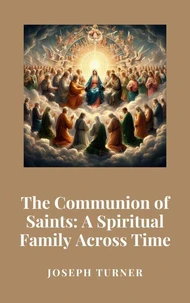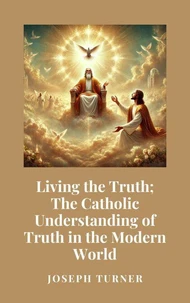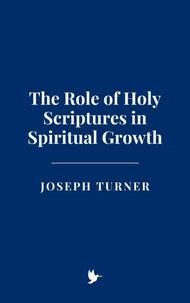Poverty of Spirit: Embracing Simplicity for Spiritual Growth
Par :Formats :
Disponible dans votre compte client Decitre ou Furet du Nord dès validation de votre commande. Le format ePub est :
- Compatible avec une lecture sur My Vivlio (smartphone, tablette, ordinateur)
- Compatible avec une lecture sur liseuses Vivlio
- Pour les liseuses autres que Vivlio, vous devez utiliser le logiciel Adobe Digital Edition. Non compatible avec la lecture sur les liseuses Kindle, Remarkable et Sony
 , qui est-ce ?
, qui est-ce ?Notre partenaire de plateforme de lecture numérique où vous retrouverez l'ensemble de vos ebooks gratuitement
Pour en savoir plus sur nos ebooks, consultez notre aide en ligne ici
- FormatePub
- ISBN8230406907
- EAN9798230406907
- Date de parution23/02/2025
- Protection num.pas de protection
- Infos supplémentairesepub
- ÉditeurIndependently Published
Résumé
Poverty of spirit, one of the central themes in Christian spirituality, calls believers to a life of detachment, humility, and profound reliance on God alone. This virtue is one of the Beatitudes described by Christ in His Sermon on the Mount: "Blessed are the poor in spirit, for theirs is the kingdom of heaven" (Matthew 5:3). It's a paradoxical statement, one that subverts the worldly understanding of poverty.
To be "poor in spirit" does not mean merely being destitute or impoverished in the material sense, but rather involves a spirit of humility, freedom from attachment to worldly possessions, and a complete dependence on God's grace. This profound teaching, though simple in its expression, offers a deep and transformative path to spiritual growth. The historical roots of poverty of spirit can be traced back to the teachings of Jesus Christ, who exemplified this virtue in His life.
Born in humble circumstances, with no place to lay His head (Luke 9:58), Christ fully embraced poverty, living not for wealth or comfort but for the will of the Father. His life was a model of detachment from earthly desires, revealing that true richness comes not from possessions but from a heart centered on God. In the Gospel of Matthew, when the rich young man asks Jesus how to attain eternal life, Christ instructs him to sell all his possessions, give to the poor, and follow Him (Matthew 19:21).
This radical call to detachment challenges the human tendency to place value in material things and encourages a life of simplicity, wherein one's heart is free to be devoted entirely to God.
To be "poor in spirit" does not mean merely being destitute or impoverished in the material sense, but rather involves a spirit of humility, freedom from attachment to worldly possessions, and a complete dependence on God's grace. This profound teaching, though simple in its expression, offers a deep and transformative path to spiritual growth. The historical roots of poverty of spirit can be traced back to the teachings of Jesus Christ, who exemplified this virtue in His life.
Born in humble circumstances, with no place to lay His head (Luke 9:58), Christ fully embraced poverty, living not for wealth or comfort but for the will of the Father. His life was a model of detachment from earthly desires, revealing that true richness comes not from possessions but from a heart centered on God. In the Gospel of Matthew, when the rich young man asks Jesus how to attain eternal life, Christ instructs him to sell all his possessions, give to the poor, and follow Him (Matthew 19:21).
This radical call to detachment challenges the human tendency to place value in material things and encourages a life of simplicity, wherein one's heart is free to be devoted entirely to God.
Poverty of spirit, one of the central themes in Christian spirituality, calls believers to a life of detachment, humility, and profound reliance on God alone. This virtue is one of the Beatitudes described by Christ in His Sermon on the Mount: "Blessed are the poor in spirit, for theirs is the kingdom of heaven" (Matthew 5:3). It's a paradoxical statement, one that subverts the worldly understanding of poverty.
To be "poor in spirit" does not mean merely being destitute or impoverished in the material sense, but rather involves a spirit of humility, freedom from attachment to worldly possessions, and a complete dependence on God's grace. This profound teaching, though simple in its expression, offers a deep and transformative path to spiritual growth. The historical roots of poverty of spirit can be traced back to the teachings of Jesus Christ, who exemplified this virtue in His life.
Born in humble circumstances, with no place to lay His head (Luke 9:58), Christ fully embraced poverty, living not for wealth or comfort but for the will of the Father. His life was a model of detachment from earthly desires, revealing that true richness comes not from possessions but from a heart centered on God. In the Gospel of Matthew, when the rich young man asks Jesus how to attain eternal life, Christ instructs him to sell all his possessions, give to the poor, and follow Him (Matthew 19:21).
This radical call to detachment challenges the human tendency to place value in material things and encourages a life of simplicity, wherein one's heart is free to be devoted entirely to God.
To be "poor in spirit" does not mean merely being destitute or impoverished in the material sense, but rather involves a spirit of humility, freedom from attachment to worldly possessions, and a complete dependence on God's grace. This profound teaching, though simple in its expression, offers a deep and transformative path to spiritual growth. The historical roots of poverty of spirit can be traced back to the teachings of Jesus Christ, who exemplified this virtue in His life.
Born in humble circumstances, with no place to lay His head (Luke 9:58), Christ fully embraced poverty, living not for wealth or comfort but for the will of the Father. His life was a model of detachment from earthly desires, revealing that true richness comes not from possessions but from a heart centered on God. In the Gospel of Matthew, when the rich young man asks Jesus how to attain eternal life, Christ instructs him to sell all his possessions, give to the poor, and follow Him (Matthew 19:21).
This radical call to detachment challenges the human tendency to place value in material things and encourages a life of simplicity, wherein one's heart is free to be devoted entirely to God.






















